Hello, all:
As this is my first post to the blog, I’ll introduce myself. I’m Elizabeth Corwin, the Associate Director of Academic Support. I graduated from Pace Law School in 1999. Having planned throughout to go into criminal prosecution or some other nonprofit job, I ended up a a large Connecticut-based firm. (A lesson that you don’t really need to know the answer to the looming question of “what are you doing after law school?”.) I spent 7 years there, doing commercial litigation (large companies suing each other over failed business deals) and government investigations (the government investigates your client for some sort of possible wrongdoing and asks to be given almost everry document–electronic and print–that the client has ever produced). To fulfill my nonprofit dreams, I then went to Pace Women’s Justice Center and worked there for 4 years for victims of domestic violence proceeding with cases in Family Court. I’ve also been an adjunct co-teaching Interviewing, Counseling and Negotiating with Prof. Griffin for the past 4 years. Now, I’m here to support you academically!
In that vein, I’ve heard from a lot of first years and some second years that you’d like an example of IRACing. I love IRAC; one of my most memorable moments of practicing law was when the partner with the best reputation in the firm for legal writing wrote on one page of my memo of law, “good use of case!”. In the hope that you will learn to love IRAC too, I here post an example modified from one of my family law motions. I make no representation on whether my citations are correct for a law school paper. I’ve put in the IRAC acronym as signals for you; you obviously would not use those in your papers.
As always, please let me (ecorwin@law.pace.edu) or Danielle (dkocal@law.pace.edu) if there is any academic support we can provide to you.
Elizabeth
Memorandum
From: Law Student
To: Supervising Attorney, Family Court Legal Program
Re: Possible Motion to Dismiss the Family Offense Petition filed by our client’s ex-husband
[ISSUE] The issue presented here is whether a Family Offense has been committed if our client called her ex-husband derogatory names. On March 1, 2010, Mr. M. filed a Family Offense Petition against Ms. M. claiming that Ms. M. had committed the family offense of “harassment in the second degree” under Penal Law § 240.26(3). The Family Offense Petition consists of one allegation: that Ms. M. called Mr. M. a “loser, sh**head” and made “various other derogatory remarks.” [RULE] Penal Law § 240.26(3) states as follows: “A person is guilty of harassment in the second degree when, with intent to harass, annoy or alarm another person… (3) He or she engages in a course of conduct or repeatedly commits acts which alarm or seriously annoy such other person and which serve no legitimate purpose.”
In a Motion to Dismiss, the court must assume that all the allegations in the petition are true. You have asked to me assume that Ms. M.’s actions as alleged constituted a “course of conduct” and did served “no legitimate purpose.”
[APPLICATION/precedent] In a similar case, the Family Court found that no family offense was committed where petitioner alleged and proved through testimony that respondent “comes home drunk, yells at his children…and makes rude comments to his wife.” Dora V. v. Ramon U., 2003 NY Slip Op 51320U, *6 (Queen County Fam Ct, 2003). The Court reasoned that “[w]ords alone cannot satisfy the elements of” harassment in the second degree. Dora V., 2003 NY Slip Op 51320U at *3. The Court went on to quote a Court of Appeals opinion that “‘even vulgar, derisive and provocative’ speech is protected by the First Amendment unless it presents ‘a clear and present danger of some serious substantive evil.’” People v. Dietze, 75 N.Y.2d 47, 51-52 (1989).
[APPLICATION/facts of this case] Here, the allegation is that Ms. M. called Mr. M. names, used vulgar language toward him and made “various other derogatory remarks.” This is very similar to the Dora V. case, where unspecified “yelling” and “rude comments” occurred. Ms. M.’s speech toward Mr. M. is also alleged to have been vulgar, as in the Dietze case. In both those cases, rude and vulgar words did not fulfill the elements of harassment in the second degree. Further, Mr. M. does not allege that any “danger” was presented through those words, as required under the Dietze case. [CONCLUSION] Therefore, the allegation of Mr. M. does not satisfy the elements of harassment in the second degree.

Leave a Reply